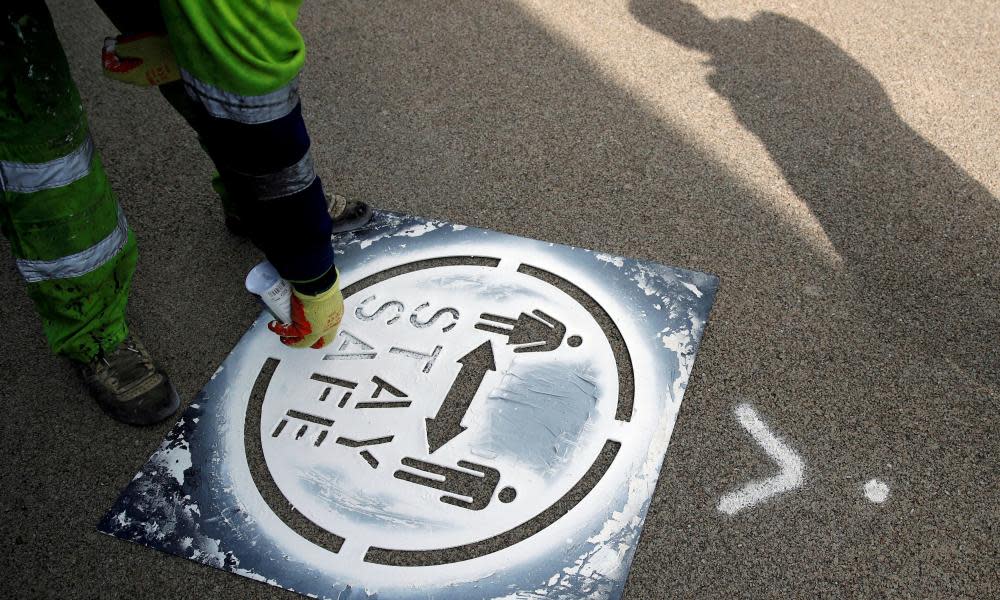£13 a day to self-isolate 'a slap in the face' for low-paid in England

The government’s trial scheme to pay low-paid workers in England up to £13 a day to self-isolate over coronavirus has been described as a “slap in the face” that could leave millions of people without enough money on which to live.
Scientists, political leaders and trade unions said the “paltry” amount should be increased to cover any lost income, and the scheme should be expanded to millions of workers across England, and not just those in coronavirus hotspots.
Frances O’Grady, the general secretary of the Trades Union Congress (TUC), said the government’s test-and-trace system would fail unless people could afford to self-isolate when required to do so. “These paltry payments will not make the difference needed,” she said.
In a trial starting on Tuesday in Oldham, Pendle and Blackburn with Darwen, which all have high infection rates, low-paid workers who test positive for Covid-19 will receive £130 for their 10-day isolation period – £13 a day – if they cannot work from home.
People they have been in close contact with, including members of their household, who have to isolate for 14 days will get £182. The amounts equate to about a fifth of the median weekly wage in Greater Manchester, where part of the trial is being held.
The move follows weeks of campaigning by regional mayors, councils and trade unions who said millions of people across the country could not afford to isolate without pay for a fortnight.
default
Workers will have to show proof of employment or self-employment, be unable to work from home, and be receiving universal credit or working tax credit in order to be eligible for the scheme.
The Department of Health and Social Care said stringent checks would be carried out on people to prevent fraud, and the payments would aim to be made within 48 hours of evidence being provided.
Matt Hancock, the health secretary, said the amount was based on statutory sick pay (SSP) of £95.85 a week, but it was roundly criticised as going “nowhere near far enough”.
There are an estimated 300,000 people in Greater Manchester who may not be able to afford to self-isolate, including self-employed people and 90,000 workers who do not qualify for SSP because their incomes are too low. These include hospital porters, cleaners, warehouse workers and hospitality staff.
Prof Susan Michie, the director of the Centre for Behaviour Change at University College London and a member of the Scientific Pandemic Influenza Group on Behaviours, a government advisory group, said the payments were not enough and should not be limited to people living in areas with high infection rates. “This is a question of guaranteeing no financial loss,” she said.
Stephen Reicher, another member of the Sage subcommittee on behavioural science, described the scheme as “woefully inadequate in multiple ways”, adding that the financial support should be increased and expanded across England.
Mohammed Iqbal, the leader of Pendle borough council, one of the areas where the scheme is being trialled, said: “I welcome the fact that there is a financial package in place but the figures that the government has introduced are really a slap in the face for those people who sadly test positive.”
Dominic Harrison, the director of public health at Blackburn with Darwen council, said the self-isolation payments should be equivalent to the jury service fee of £64.95 a day.
Steve Rotheram, the mayor of the Liverpool city region, said the figure “falls far below what people need” and would force people to “choose between putting food on the table or keeping their communities safe”. He said people should be able to claim back any lost wages from the government.
Hancock told Times Radio the scheme was “the first step in paying people to self-isolate” and suggested the payment could be raised if the trial were expanded.
Jim McMahon, the Labour MP for Oldham West and Royton, said it was nowhere near enough to replace the lost income of people such as taxi drivers, warehouse workers, delivery drivers and security operators who would face a choice between self-isolating without pay or providing for their families.
Andy Burnham, the mayor of Greater Manchester, who led calls for low-paid workers to be paid their full normal wage for the quarantine period, said he was pleased ministers had acknowledged the issue but the scheme it went “nowhere near far enough” and would “leave people without enough to live on”.
He added: “The health secretary has already said that he couldn’t live on statutory sick pay at £95 a week. So how can an announcement like this work?”

 Yahoo News
Yahoo News 
